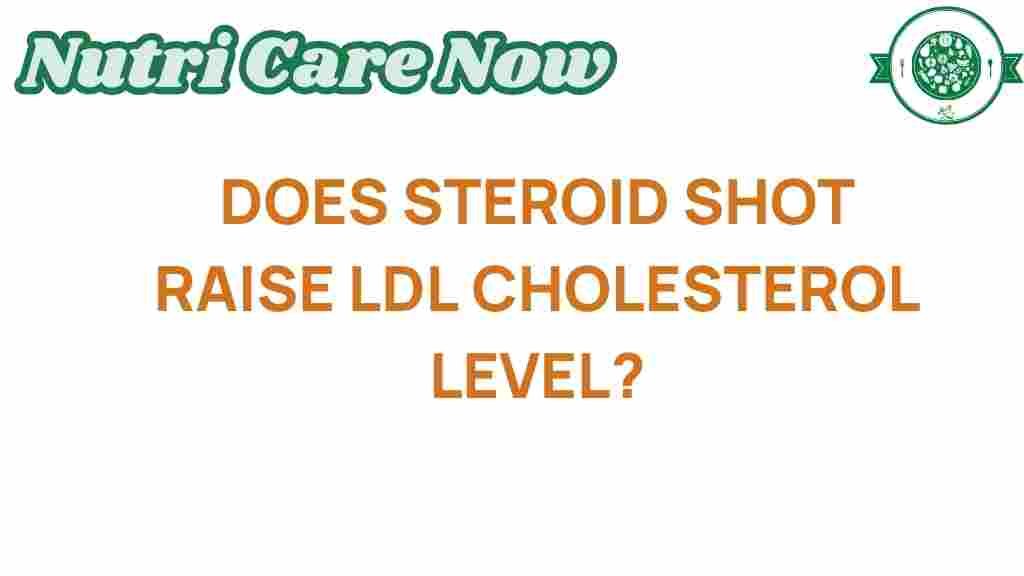The Surprising Link Between Steroid Shots and LDL Cholesterol Levels
In recent years, the medical community has increasingly focused on the relationship between steroid shots and LDL cholesterol levels. While steroid injections are commonly used to treat various conditions, particularly those involving inflammation, the effects they have on cardiovascular health are often overlooked. This article delves into the medical research surrounding this topic, examining the implications for patient awareness, health risks, and treatment effects.
Understanding Steroid Shots
Steroid shots, also known as corticosteroid injections, are anti-inflammatory medications used to treat a range of conditions, including:
- Arthritis
- Tendinitis
- Bursitis
- Allergic reactions
These injections work by reducing inflammation and suppressing the immune response, providing quick relief from pain and swelling. However, while they can be effective for short-term treatment, there are potential long-term health risks associated with their use, particularly concerning LDL cholesterol levels.
The Role of LDL Cholesterol
LDL cholesterol, often referred to as “bad cholesterol,” plays a crucial role in cardiovascular health. High levels of LDL cholesterol can lead to the buildup of plaques in the arteries, increasing the risk of heart disease and stroke. Understanding the factors that influence LDL levels is essential for maintaining overall health.
Medical Research on Steroid Shots and LDL Cholesterol
Recent studies have shed light on the surprising connection between steroid shots and LDL cholesterol levels. Research indicates that corticosteroid injections can lead to an increase in LDL cholesterol, posing significant health risks for individuals receiving these treatments.
- A study published in the Journal of the American Medical Association found that patients receiving corticosteroid injections experienced a notable rise in LDL levels.
- Another study in the National Institutes of Health database reported an increase in cardiovascular events among patients treated with steroid shots.
These findings highlight the need for increased patient awareness regarding the potential side effects of steroid injections, particularly concerning cholesterol levels and cardiovascular health.
How Steroid Shots Affect LDL Cholesterol
The exact mechanism by which steroid shots influence LDL cholesterol levels is complex and involves several biological pathways:
- Metabolic Changes: Steroids can alter lipid metabolism in the liver, leading to increased production of LDL particles.
- Insulin Sensitivity: Corticosteroids can reduce insulin sensitivity, which may contribute to dyslipidemia, a disorder of lipoprotein metabolism.
- Inflammation Reduction: While steroid shots reduce inflammation, they may also disrupt the balance of other hormones involved in cholesterol regulation.
As a result, patients receiving steroid shots may experience fluctuations in their cholesterol levels, particularly LDL cholesterol, which can pose significant health risks over time.
Step-by-Step Process: Monitoring LDL Cholesterol Levels
For individuals receiving steroid shots, monitoring LDL cholesterol levels is crucial. Here’s a step-by-step process to ensure proper monitoring:
- Consult Your Doctor: Before starting treatment with steroid shots, discuss your cardiovascular health and cholesterol levels with your healthcare provider.
- Baseline Testing: Obtain a baseline lipid panel to establish your current LDL cholesterol levels.
- Regular Monitoring: Schedule follow-up appointments to monitor cholesterol levels during and after steroid treatment.
- Adjust Treatment as Necessary: If LDL levels rise significantly, work with your doctor to adjust your treatment plan accordingly.
- Maintain a Healthy Lifestyle: Implement diet and exercise changes to help manage cholesterol levels effectively.
Troubleshooting Tips for Patients
If you are undergoing treatment with steroid shots and are concerned about your LDL cholesterol levels, here are some troubleshooting tips:
- Discuss Alternatives: Ask your healthcare provider about alternative treatments that may have less impact on cholesterol levels.
- Consider Dietary Changes: Adopt a heart-healthy diet rich in fruits, vegetables, whole grains, and healthy fats to help manage cholesterol.
- Stay Active: Engage in regular physical activity to improve overall cardiovascular health.
- Educate Yourself: Stay informed about the potential side effects of steroid shots and their impact on your health.
Conclusion: The Importance of Patient Awareness
The link between steroid shots and LDL cholesterol levels is a critical issue that requires greater attention from both healthcare providers and patients. As medical research continues to uncover the potential health risks associated with steroid use, patient awareness becomes paramount.
By understanding how steroid shots can affect cholesterol levels and implementing strategies for monitoring and management, patients can take proactive steps to protect their cardiovascular health. Always consult with a medical professional regarding any concerns you may have about your treatment options and their effects on your overall health.
For more information on managing cholesterol levels, visit The American Heart Association.
Ultimately, fostering an informed dialogue between patients and healthcare providers about the implications of steroid treatments will help mitigate risks and promote healthier outcomes.
This article is in the category Health and created by NutriCareNow Team
